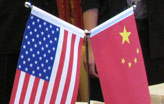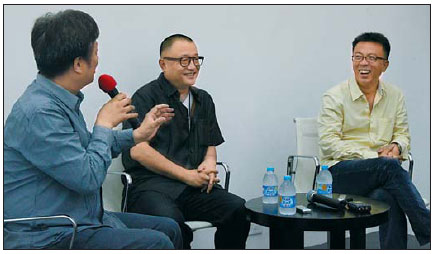People
Two old friends, two views of modern China
Updated: 2011-07-19 07:55
By Zhang Kun (China Daily)
|
Wang Xiaoshuai (middle) and Liu Xiaodong (right) share their views on youth, art and homecoming at an open dialogue at Minsheng Museum of Art in Shanghai. Provided to China Daily |
When Wang Xiaoshuai realized he could never paint as finely as his high school pal Liu Xiaodong, he gave up painting and turned to filmmaking.
Wang is now an international award-winning film director, and Liu one of the best contemporary oil painters in China.
The two old friends - Liu, 48, and Wang, 45 - had an open dialogue at Minsheng Museum of Art in Shanghai recently, sharing their stories and ideas about youth, art and homecoming.
Liu gave a lecture on July 9 at Shanghai Museum. He is the second artist - after Xu Bing, vice-president of the Central Academy of Fine Arts - to speak at a series of lectures to be held in celebration of the 60th anniversary of the museum.
Liu spoke about his attitude toward traditional art and contemporary relevance, how he has made use of his solid skills training to portray familiar scenes and modern situations in life.
He was one of the few students from the Central Academy of Fine Arts to have a solo exhibition right after graduation. Wang, however, went through some years in low tide working in Fujian Film Studio in the early 1990s.
He came back to Beijing in 1993, determined to make his first movie. "I had to start with something familiar, so I wrote a story about art students in Beijing," Wang recalled. He also needed familiar actors, so ultimately Liu and his wife Yu Hong, both artists, took the leading roles.
Since then, Wang has won many international awards for his movie productions, including the Silver Bear at the Berlin International Film Festival in 2001. His latest project, Chongqing Blues, competed for the Golden Palm at last year's Cannes International Film Festival.
At the same time Liu, the painter, gradually established his distinctive artistic style, portraying ordinary Chinese people in their daily lives.
Liu was never away from the film industry, though. He worked as the artistic director for Zhang Yuan's Beijing Bastards, and played himself as the hero in Jia Zhangke's documentary, Dong. Last year when he went to his hometown of Jincheng, in Northeastern China's Liaoning province, to paint his old friends and town folks, filmmakers from Taiwan followed him on the way and made a documentary Hometown Boy about his homecoming under the supervision of Hou Hsiao-Hsien, arguably Taiwan's most acclaimed film director.
"I became involved in filmmaking largely because of Xiaoshuai and his circle of friends," Liu told the media. "Filmmakers are active and their working process is so much fun. Filmmakers have lots of fans. Everybody likes to see them work."
When he was back home in Jincheng, together with the filmmakers from Taiwan, "my old friends preferred to hang out with the filmmakers", Liu said, not without jealousy.
"Xiaodong went back home rich and prosperous," Wang said jokingly. "All the townfolk and old friends were so impressed by his success, and he pretended to be like the old times, as if he was still one of them, and then he went back sneakily to paint their portraits, though he has nothing in common with them now."
Some critics accused Liu of taking advantage of the poor people he portrayed, and making a profit from depicting their underprivileged lives. His paintings of them have sold for more than 10 million yuan ($1.5 million) apiece at major auctions.
"This is hardly avoidable as we live in a commercial age," Liu said. "Society commercializes a person incredibly quickly. As an artist, I have to be alert about being commercialized too."
An artist with a realistic style, Liu has painted migrants from the Three Gorges area and people of minority religious beliefs in China's remote countryside.
"Our history has always been written by the authorities. I wanted to paint my own version of grassroots history, from the viewpoint of individuals," he said.
His homecoming and portraits of Jincheng marked his latest effort in creating a unique historical narrative of contemporary China. When he went to paint their portraits, together with the filmmakers recording the process, his old friends and country folk embraced the experience wholeheartedly.
"They wanted to be painted and filmed, to prove the value of their life as an ordinary person. That surprised me, and moved me," Liu said.
Wang, the film director, is "a man with no hometown". He was born in Shanghai and moved with his parents to Guiyang in Southwest China's Guizhou province. Later he lived in Wuhan, capital of Central China's Hubei province, before going to school in Beijing.
"I used to consider Guiyang my hometown, but in the past few years when I went there for work, people looked at me like I was a total stranger," Wang said.
This feeling of being an alien bothered him, until one day he realized many people shared the same sentiment.
"Mass migration is a unique phenomenon for a changing society like China," he said. "I am glad to be a representative of these migrating people, and to be able to tell their stories.
"My movies may be depressing, but they provide a different experience."
China Daily
(China Daily 07/19/2011 page19)

Specials

China-US Governors Forum
The first China-US Governors Forum is held July 15 in the Salt Lake City, the United States.

My China story
Foreign readers are invited to share your China stories.

Rare earths export quota
China kept its export quota at almost the same level as last year.
